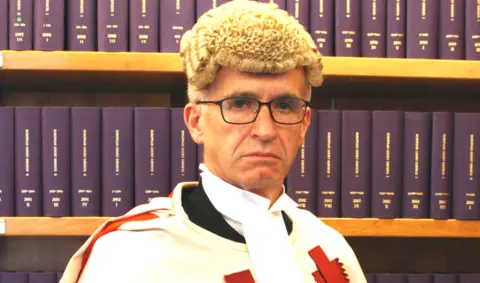Man given community sentence for rape of girl, 13, is acquitted
A man given a community sentence for raping a 13-year-old girl when he was 17 has been acquitted by appeal judges.
Sean Hogg, 22, was convicted of attacking the girl twice in Dalkeith Country Park, Midlothian, in 2018.
Due to new sentencing guidelines for under-25s, Mr Hogg avoided jail and was instead given 270 hours of unpaid work.
His lawyers said judge Lord Lake misdirected the jury at the trial in April.
Prosecutors decided it was not in the interests of justice to seek a retrial.
Scotland's second more senior judge Lady Dorrian said Mr Hogg should not have been convicted due to an "insufficiency of evidence".
She said he would have been acquitted if Lord Lake had not made an error in explaining rape law to jurors.
Mr Hogg had been found guilty of raping the girl, who is now 19 years old, after a trial at the High Court in Glasgow.
It was alleged that Mr Hogg, from Hamilton in South Lanarkshire, attacked her twice between March and June 2018.
His lawyer, Donald Findlay KC earlier told the Court of Criminal Appeal in Edinburgh that Lord Lake did not follow correct legal procedures to establish Mr Hogg's guilt.
 Judiciary of Scotland
Judiciary of ScotlandHe said the judge had given the jurors legal direction that the girl's evidence was corroborated by the account of another witness.
This witness told the court that the girl had been "distressed" following an incident involving Mr Hogg.
Mr Findlay said this supported the girl's "credibility" and it was wrong for the judge to have told jurors this.
He added: "It pains me to say this, but there has been a very significant miscarriage of justice at the hands of the judge."
The hearing was also told that the prosecution did not ask detailed questions about why the girl was distressed.
Mr Findlay said this resulted in the Crown being unable to corroborate her account of rape.
He told appeal judges Lady Dorrian, Lord Matthews and Lord Pentland that the judge's actions led to his client being wrongly convicted.
Widespread criticism
The Crown Office accepted that the judge misdirected the jury and said part of the verdict should be quashed.
But prosecutors argued that the jury still had enough evidence for Mr Hogg to be convicted of raping the girl on one occasion.
However, the appeal judges agreed with the submissions made to them by Mr Findlay and the conviction was quashed.
Lady Dorrian said: "The inevitable result of the appeal must be acquittal.
"We are satisfied, but for the error of the trial judge, this would have been the result at trial."


The 13-year-old girl that Sean Hogg was acquitted of raping is now 19 and considering her legal options.
She could turn to the civil courts where the burden of proof is lower and sue for damages.
An alternative would be to pursue a private prosecution, although that's a long and difficult road to go down.
Rape is a notoriously difficult crime to prove. The vast majority of reported rapes do not reach court and of those that do, just over half result in convictions.
A bill going through the Scottish Parliament proposes major changes to the system, including a pilot of judge-only rape trials.
According to her solicitor, the woman in this case wants juries, not judges, to decide verdicts.
And what of the judge whose misdirection resulted in a man being wrongly convicted of rape?
A spokesperson for the Judicial Office for Scotland said judges often have to make difficult decisions, many of which are upheld by the appeal court.
The spokesperson said Lord Lake will have been made aware of the outcome of Sean Hogg's appeal.

Moorov doctrine
In her judgement, Lady Dorrian said Lord Lake and the prosecutor had agreed that a legal rule for rape cases known as the Moorov doctrine was the correct way to convict Hogg.
Moorov, which is named after a case in the 1930s, is when corroboration can be found from evidence of similar incidents of sexual assault committed around the same time.
At his trial, Mr Hogg had initially faced sexual assault charges against a second woman. However, he was acquitted of these.
Lady Dorrian said the Moorov rule was therefore wrongly applied in this case.
She wrote: "The only available means of corroboration was the application of Moorov, without that there could be no route any verdict of guilt."
Turned back her life
Mr Hogg had avoided jail after being found guilty by the jury at the trial in April.
The community sentence given by Lord Lake attracted widespread criticism from rape charities and other groups at the time.
The judge said that if Mr Hogg had committed the crime when he was over 25, he would have been jailed for four or five years.
Mr Hogg was also put under supervision and added to the sex offenders register following his conviction.
Following his acquittal, the girl's lawyer Aamer Anwar said it had turned her life "back six years to when she was 13".
In a statement, he said: "When the jury returned a verdict of guilty, she thought finally she could move on with her life.
"It is always the responsibility of the trial judge to formulate the appropriate legal directions to give a jury.
"In this case, the procedure adopted was manifestly unfair and prejudicial to the defence and, on this basis the appeal had to succeed."
Mr Anwar said it was "important for his client" that the Crown had not renounced its right to prosecute again if any new evidence became available.
